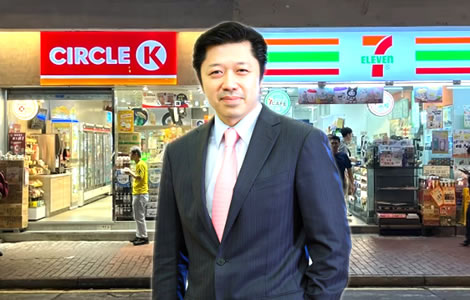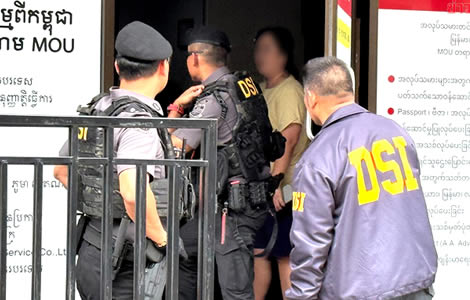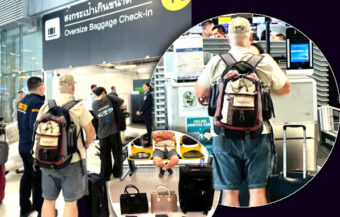7-Eleven’s Japanese owner rejects a $39 billion buyout offer from Canadian Circle K operator Couche-Tard. CP Group, Thailand’s 7-Eleven franchise owner, closely watches the deal. Thailand, with 14,500 stores, remains the second-largest 7-Eleven market globally.
Thailand’s huge CP Group conglomerate led by Chief Executive Officer Suphachai Chearavanont will be watching avidly as Couche-Tard, a Canadian convenience store operator, attempts to buy the 7-Eleven franchise chain. The multinational behemoth owns stores across the world, including the Circle K convenience store chain. It has stores in Canada, the United States, Mexico, Ireland, Norway, Sweden, Denmark, Estonia, Latvia, Lithuania, Poland, Japan, China, and Indonesia. The attempted purchase of the world’s most well-known convenience store brand comes as Japanese firms are thought to be undervalued. This has come about through depressed Japanese stock values. Thailand is the second-largest country for 7-Eleven after Japan. The chain was established in Texas in 1927 before being taken over by a Japanese firm in the 1990s.

Seven & i Holdings, the Japanese owner of the 7-Eleven convenience store chain, has firmly rejected a $39 billion cash takeover bid from Canadian convenience store giant Alimentation Couche-Tard.
The board of Seven & i, in a letter to Couche-Tard, stated that the offer “grossly undervalues” the Japanese conglomerate and fails to account for the significant regulatory risks that would accompany such a transaction.
The unsolicited bid, which surfaced on August 19, proposed $14.86 per share in cash. However, Seven & i’s board, led by chair Stephen Dacus, deemed the proposal insufficient. It argued that it was not in the best interest of shareholders and other stakeholders.
Board cites insufficient offer and regulatory risks
In the letter to Couche-Tard, Dacus expressed the company’s willingness to engage in discussions. That is if a more favourable offer were presented. Of course, it would have to be one that fully recognized Seven & i’s standalone intrinsic value. However, he emphasised that the current proposal did not warrant substantive discussions.
The rejection of the offer underscores Seven & i’s belief in the strength of its diverse business portfolio, which spans convenience stores, restaurants, financial services, and supermarkets across Japan and the United States. The company’s board also highlighted the regulatory hurdles that any deal with Couche-Tard would face, particularly from U.S. competition authorities, as a key factor in their decision to reject the bid.
Couche-Tard remains confident despite setback
The Canadian company owns the rival Circle K convenience store chain. Certainly,it has been on an expansion spree in recent years. Despite the setback, Couche-Tard executives remained confident in their ability to finance and complete the acquisition. However, they acknowledged that they had walked away from more deals than they had closed in the past. At length, this signals that the company’s pursuit of Seven & i may not be over.
Following the rejection, shares of Seven & i dropped 1.8% on Friday. In effect, reflecting investor speculation that Couche-Tard might return with an improved offer. Brokers noted that some investors were betting on the possibility of a revised bid. At the same time, there may be other potential takeovers of undervalued Japanese companies.
Signals of potential future negotiations
Despite the initial rejection, there are indications that Seven & i might be open to further discussions. A fund manager with a small stake in the company noted that the rejection letter suggested a willingness to negotiate. Indeed, it implied that the board may be receptive to a more attractive offer.
The proposed acquisition by Couche-Tard would be the largest-ever takeover bid in Japan by a foreign company. The bid comes at a time when Japan’s corporate governance reforms are putting pressure on boards to prioritise shareholder interests. These reforms have led to a more dynamic mergers and acquisitions (M&A) environment in the country. In turn, foreign companies are increasingly targeting Japanese firms for takeovers.
7-Eleven’s role in Japan’s social infrastructure
Nevertheless, Seven & i’s management, will defend itself against a forced buyout. Essentially, is expected to emphasise the critical role that 7-Eleven stores play in Japan’s social infrastructure.
The convenience store chain is seen as vital in a country prone to natural disasters, providing essential goods and services during emergencies. This argument could be a significant factor in any further negotiations with Couche-Tard.
Analysts have estimated that the Couche-Tard bid, which includes ¥3 trillion ($20.4 billion) in net debt and minority interest, values Seven & i at an enterprise value of approximately ¥8.6 trillion ($60 billion). Despite the bid, Seven & i’s current market capitalisation remains close to the offer price, reflecting investor expectations that the company might receive a higher bid or that another suitor could emerge.
Foreign interest in Japan’s retail sector grows
The bid from Couche-Tard also highlights the growing interest of foreign companies in Japan’s retail sector, which has traditionally been seen as difficult for outsiders to penetrate. Japan’s convenience store market, in particular, is highly competitive and saturated, with companies like 7-Eleven, Lawson, and FamilyMart dominating the landscape.
Seven & i’s rejection of the bid does not necessarily spell the end of the story. Given the size of the offer and Couche-Tard’s track record of pursuing strategic acquisitions, there is speculation that the Canadian company may return with an improved proposal. However, any future deal would need to address the regulatory concerns and provide a valuation that satisfies Seven & i’s board and shareholders.
7-Eleven dominates Thai convenience store market with an expanding presence led by the CP Group
In short, while Seven & i has rejected Couche-Tard’s initial $39 billion offer, the situation remains fluid. The potential for further negotiations and the broader implications for Japan’s M&A landscape mean that this story is far from over. Investors and industry watchers will be closely monitoring any developments in the coming weeks as both companies weigh their next steps.
The first 7-Eleven store in Thailand opened in 1989 on Bangkok’s Patpong Road. Today, the convenience store chain has grown to a staggering 14,500 stores and counting.in turn this is up from 13,838 locations across the country as of 2022, up from 12,432 in 2020.
The expansion is driven by CP All Public Company Limited, a listed subsidiary of the Charoen Pokphand Group. Basically, it holds the franchise rights for 7-Eleven in Thailand since 1988.
Billionaire rivals eye dominance of the Kingdom’s 7-Eleven chain run by the Chearavanont family
7 Eleven expands business in Thailand, with the economy looking up, it embraces change
The chain operates through a mix of company-owned (45%) and franchised (55%) stores, catering to the diverse needs of Thai consumers. In 2018, 7-Eleven generated ฿335.532 billion in revenue for CP All, underlining its significant contribution to the parent company’s financial success.
With a 70% market share in Thailand’s convenience store sector, 7-Eleven faces competition from around 7,000 other convenience stores, including FamilyMart, and 400,000 traditional “mom and pop” shops.
Despite the competition, 7-Eleven’s dominance remains unchallenged, making Thailand home to the second-largest number of 7-Eleven stores globally, behind only Japan.
Join the Thai News forum, follow Thai Examiner on Facebook here
Receive all our stories as they come out on Telegram here
Follow Thai Examiner here
Further reading:
Billionaire rivals eye dominance of the Kingdom’s 7-Eleven chain run by the Chearavanont family
Richest man in Thailand says COVID-19 is like a World War, the kingdom could end up a big loser
Drinks giant Thai Beverage to resume expansion with Singapore IPO for Asean regional beer operation
7 Eleven expands business in Thailand, with the economy looking up, it embraces change


















